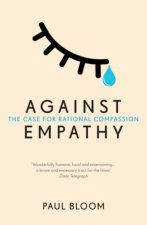
Kód: 04117460
Humanity
Autor Jonathan Glover
This book is about history and morality in the twentieth century. It is about the psychology which made possible Hiroshima, the Nazi genocide, the Gulag, the Chinese Cultural Revolution, Pol Pot's Cambodia, Rwanda, Bosnia and many ... celý popis
- Jazyk:
 Angličtina
Angličtina - Väzba: Brožovaná
- Počet strán: 480
Nakladateľ: Vintage Publishing, 2001
- Viac informácií o knihe

28.13 €
Dostupnosť:
50 % šanca Máme informáciu, že by titul mohol byť dostupný. Na základe vašej objednávky sa ho pokúsime do 6 týždňov zabezpečiť.
Máme informáciu, že by titul mohol byť dostupný. Na základe vašej objednávky sa ho pokúsime do 6 týždňov zabezpečiť.Prehľadáme celý svet
Mohlo by sa vám tiež páčiť
-

A Handbook of Critical Approaches to Literature
188.09 € -

Causing Death and Saving Lives
14.21 € -23 % -

Man's Search For Meaning
11.49 € -19 % -

Pathological Altruism
125.96 € -

Fascism
21.37 € -

Everybody Lies
12.09 € -23 % -

On Bullshit
10.18 € -10 % -

But Seriously
12.09 € -23 % -

Magical Techniques
21.88 € -

Stand Firm - Resisting the Self-Improvement Craze
21.88 € -

Hubble's Universe: 2nd Ed; Greatest Discoveries and Latest Images
34.38 € -15 % -

Modernism and Fascism
211.39 € -

Vought F4U Corsair
21.57 € -16 % -

Shadow of the Tomb Raider The Official Art Book
34.38 € -15 % -

Humankind
12.19 € -15 % -

Edison
18.55 € -19 % -

Bootstrapping Microservices with Docker, Kubernetes, and Terraform
53.14 € -5 % -

Lover's Eyes: Eye Miniatures from the Skier Collection
55.97 € -

Humankind
10.38 € -27 % -

Court
17.44 € -16 % -

Welcome Home
18.45 € -23 % -

Milk & Mocha Comics Collection
17.74 € -

Man Alone with Himself
7.35 € -13 % -

Antifragile
12.50 € -21 % -

Fire Study
9.97 € -16 % -

Sankarea Vol. 5
11.59 € -6 % -

General Chemistry
33.58 € -17 % -

How Enlightenment Changes Your Brain
18.55 € -

Most Good You Can Do
17.03 € -5 % -

Pride and Prejudice and Zombies
10.98 € -23 % -

Dictionary of Accounting
15.32 € -23 % -

Jim Morrison
20.56 € -23 % -

Jane Eyre
8.97 € -21 % -

Hieronymus Bosch
25.81 € -

Dog Frisbee
12.40 € -9 % -

Magie zabíjí
11.39 € -20 % -

Proroctví
45.48 € -11 % -

Alisik
7.35 € -19 % -

LOS AÑOS 60
36.10 € -

Immer fröhlich mit Bobo Siebenschläfer
10.08 € -18 % -

Seržant Bourgogne
10.78 € -22 % -

Trucky 3
31.15 €
Darujte túto knihu ešte dnes
- Objednajte knihu a vyberte Zaslať ako darček.
- Obratom obdržíte darovací poukaz na knihu, ktorý môžete ihneď odovzdať obdarovanému.
- Knihu zašleme na adresu obdarovaného, o nič sa nestaráte.
Informovať o naskladnení knihy
Zadajte do formulára e-mailovú adresu a akonáhle knihu naskladníme, zašleme vám o tom správu. Postrážime všetko za vás.
Viac informácií o knihe Humanity
Nákupom získate 71 bodov
 Anotácia knihy
Anotácia knihy
This book is about history and morality in the twentieth century. It is about the psychology which made possible Hiroshima, the Nazi genocide, the Gulag, the Chinese Cultural Revolution, Pol Pot's Cambodia, Rwanda, Bosnia and many other atrocities. In modern technological war, victims are distant and responsibility is fragmented. The scientists making the atomic bomb thought that they were only providing a weapon: how it was used was to be the responsibility of society. The people who dropped the bomb were only obeying orders. The machinery of the political decision-taking was so complex that no one among the politicians was unambiguously responsible. No one thought of themselves as causing the horrors of Hiroshima. Jonathan Glover examines tribalism: how, in Rwanda and in the former Yugoslavia, people who once lived together became trapped into mutual fear and hatred. He investigates how, in Stalin's Russia, Mao's China and in Cambodia, systems of belief made atrocities possible. The analysis of Nazism explores the emotionally powerful combination of tribalism and belief which enabled people to commit acts otherwise unimaginable. Drawing on accounts of participants, victims and observers, Jonathan Glover shows that different atrocities have common patterns which suggest weak points in our psychology. The resulting picture is used as a guide for the ethics we should create if we hope to overcome them. The message is not one of pessimism or despair: only by looking closely at the monsters inside us can we undertake the project of caging and taming them.
 Parametre knihy
Parametre knihy
Zaradenie knihy Knihy po anglicky Humanities Philosophy Ethics & moral philosophy
28.13 €
- Celý názov: Humanity
- Autor: Jonathan Glover
- Jazyk:
 Angličtina
Angličtina - Väzba: Brožovaná
- Počet strán: 480
- EAN: 9780712665414
- ISBN: 0712665412
- ID: 04117460
- Nakladateľ: Vintage Publishing
- Hmotnosť: 582 g
- Rozmery: 231 × 156 × 37 mm
- Dátum vydania: 04. January 2001
Obľúbené z iného súdka
-

Wholeness and the Implicate Order
21.17 € -1 % -

Moral Landscape
11.49 € -19 % -

On Human Nature
15.02 € -7 % -

Beyond Good and Evil
13.30 € -17 % -

Lying
18.35 € -

Beyond Good and Evil
8.87 € -23 % -

Skin in the Game
12.40 € -13 % -

The Genealogy of Morals
6.75 € -23 % -

After Virtue
25 € -13 % -

Doing Good Better
12.19 € -14 % -

Civil Disobedience and Other Essays
3.52 € -24 % -

Ethics
14.51 € -15 % -

Parmenides
10.98 € -

Responsibility and Judgment
16.53 € -21 % -

Usefulness of Useless Knowledge
10.38 € -6 % -

Apology, Crito and Phaedo of Socrates
10.98 € -

Matters of Care
34.68 € -5 % -

Beyond Good and Evil
15.62 € -

On Friendship
29.04 € -6 % -

Principia Ethica
11.79 € -

Freedom as a Value
32.47 € -

Integrity
24.80 € -

Meditations
10.08 € -13 % -

Against Empathy
11.49 € -19 % -

Theory of Moral Sentiments
16.73 € -20 % -

What We Owe to Each Other
33.98 € -1 % -

On Truth and Untruth
9.97 € -23 % -

Better Never to Have Been
42.05 € -

Reasons and Persons
29.94 € -1 % -

Inventing the Individual
13.20 € -16 % -

Beyond Freedom and Dignity
22.88 € -10 % -

Precipice
25.20 € -14 % -

A Confession
7.86 € -22 % -

What Money Can't Buy
10.68 € -17 % -

Will to Power
10.98 € -23 % -

Ethics in the Real World
19.96 € -11 % -

Justice
16.33 € -19 % -

On Human Nature
29.74 € -

Protagoras
29.84 € -

Oxford Handbook of Business Ethics
82.39 € -

Human Life, Action and Ethics
24.09 € -5 % -

Getting Back into Place, Second Edition
36 € -

New Approach to Utilitarianism
69.78 € -

Evidential Argument from Evil
33.47 € -

Oxford Studies in Metaethics 11
58.99 € -

Moral Theory - A Non-Consequentialist Approach
78.25 € -

Why It's OK to Want to Be Rich
28.23 € -

Radical Sacrifice
15.52 € -

Applied Ethics
78.25 €
Osobný odber Bratislava a 2642 dalších
Copyright ©2008-24 najlacnejsie-knihy.sk Všetky práva vyhradenéSúkromieCookies


 21 miliónov titulov
21 miliónov titulov Vrátenie do mesiaca
Vrátenie do mesiaca 02/210 210 99 (8-15.30h)
02/210 210 99 (8-15.30h)